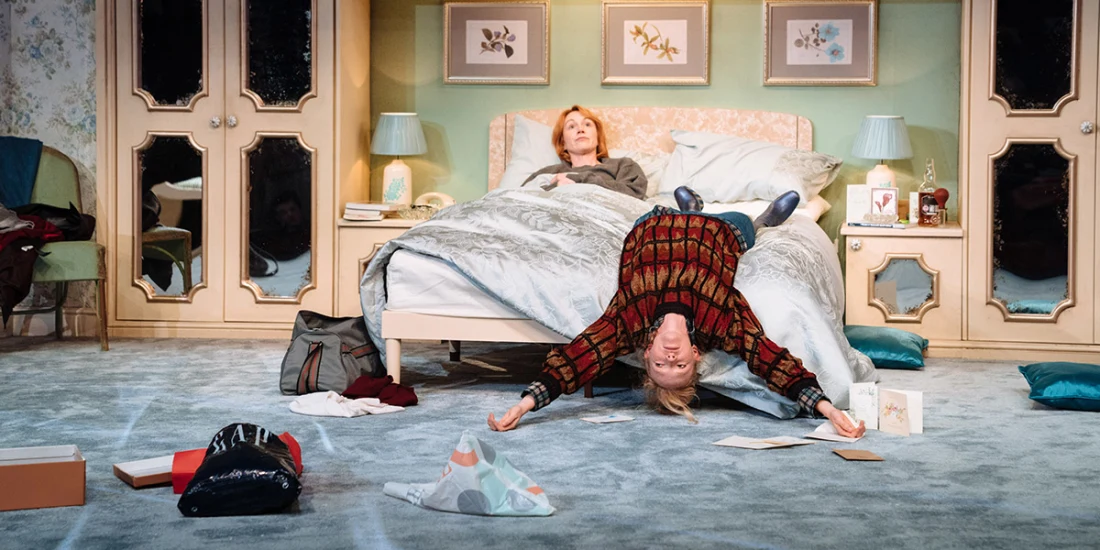'The Memory of Water' review - revival is darker, yet wearisome
Time hasn't been kind to The Memory of Water, Shelagh Stephenson's play about three sisters brought together following the death of their mother. I saw Terry Johnson's premiere of this same play at the Hampstead Theatre in 1996, and it's fascinating to note the darker hues that it has acquired under Alice Hamilton's direction. But one could equally argue that so hard-edged an approach only serves to amplify the inconsistencies in the writing, not to mention a wearying quality to the narrative that is itself addressed in the text. More than once, Stephenson has one sister or another voice a variation on "Believe me, I've had enough of all of you", as spoken by oldest sister, Mary (Laura Rogers). By the time that comment was fielded well into the second act, I was inclined to agree.
Last time out, I recall a comic emphasis to proceedings that might suggest Chekhov or Woody Allen, whose brilliant Hannah and Her Sisters is in fact here denigrated in passing. This is no longer the case. Whether yielding the stage to the difficult-seeming Mary, a doctor whose bedside manner is presumably nil, or either of her younger siblings, Stephenson pushes fractiousness to the brink and beyond. One relaxes somewhat before the interval when the prevailing bitchery is interrupted by the arrival of Mary's married lover Mike (an appealing Adam James), a fellow doctor who has to knock on a window following a cold and exhausting train journey so as to gain entrance to the bedroom where the play is set because the doorbell is broken. Not long after, the play's second male character, Frank (Kulvinder Ghir), enters the same room perfectly normally: perhaps he has a house key, which is odd if so since this isn't his house. (Similarly, a coffin rather improbably arrives during what we're told is a gathering blizzard.)
Such details aside, one might question a crucial aspect of the plot that finds Mary sleeping in the very bed once occupied by her now-dead mum, who nonetheless appears as an apparition of comparable asperity to her eldest daughter and who is played by Lizzy McInnerny in semi-Maggie Smith mode. Speaking the word "eventually" near the start, she could be channelling the great Dame directly. That rather peculiar choice of sleeping arrangement — I know very few people, myself included, who would choose to sleep in a dying parent's bed — fuels an interplay in which the sisters snipe unrelievedly at one another with nary a grace note of empathy to lighten the mood. The conversation ranges from references to Margaret Rutherford that these days are likely to draw a blank to a variation on the intergenerational showdown that the Hampstead will showcase in its next play, Marsha Norman's two-hander, 'Night, Mother.
The bluntly spoken youngest sister Catherine (Carolina Main) appears towards the end for the funeral in a questionable outfit that seems intended entirely for comic effect, while the resentful middle child Teresa (Lucy Black) tries to hold her own amid the rat-a-tat dialogue: "you have an ego the size of Asia Minor," blasts Mary, who sleeps with her sunglasses on like some movie star manqué. (Her own mother, we learn, used to put her glasses in the oven.) We hear about the aphrodisiac potential of grief and about the health supplement business, and Mary forces some sort of admission from Mike as to whether he will leave his wife for her - a rather cruel thing to do given that the unseen spouse is herself said to be ailing.
None of the women, mum included, are remotely likable, and the actresses don't attempt to endear these people to us, instead speaking very fast as if speed of delivery were itself a strategic course of attack. And though the designer Anna Reid's spacious, low-ceilinged bedroom looks like a nice place to hunker down during a storm, it's quickly made clear that the inclement weather outside is mirrored by the frostiness shared amongst this brood. Indeed, it's not only because I had just seen the West End premiere of Frozen that I half expected Rogers's commandingly reined-in Mary to burst into "Let It Go" on the way to an ending in which she speaks explicitly of learning to love the cold. It's to the credit, I suppose, of The Memory of Water this time out that it doesn't let its characters off the hook, but there's no escaping the degree to which it comes as a relief when we are released from the tundra of rancour and retribution back into the world at large.
The Memory of Water is at Hampstead Theatre to 16 October.
Photo credit: The Memory of Water (Photo by Helen Murray)
Originally published on
